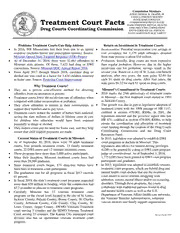
Treatment Court Facts October 2018 PDF
Preview Treatment Court Facts October 2018
Commission Members JUDGE GEORGE W. DRAPER, III JUDGE LAWRENCE MOONEY Treatment Court Facts JUDGE MARCO ROLDAN COMMISSIONER PEGGY DAVIS MARK STRINGER-MENTAL HEALTH Drug Courts Coordinating Commission ANNE PRECYTHE-CORRECTIONS STEVE CORSI-SOCIAL SERVICES SANDY KARSTEN-PUBLIC SAFETY Problems Treatment Courts Can Help Address Return on Investment in Treatment Courts In 2016, 908 Missourians lost their lives due to an opioid Incarceration: Potential incarceration cost savings or overdose (includes heroin and prescription opioids). Source: cost avoidance for 1,379 adult offenders diverted Missouri Opioid State Targeted Response (STR) Project from state prisons is about $10 million. As of December 31, 2016, there were 32,461 offenders in Probation: Initially, drug courts are more expensive Missouri state prisons. Of these, 7,422 had drug or DWI than regular probation. However, due to the higher convictions. Source: Missouri DOC Annual Report 2016 recidivism rate for probation, savings result in the From April 2017 through March 2018, caretaker drug or second year. Based on a city of St. Louis cost-benefit alcohol use was cited as a factor for 3,434 children removed analysis, after two years, the state gains $2.80 for to foster care. Source: Fostering Court Improvement each $1 spent on drug courts. After four years, the state gains $6.32 for each $1 spent on drug courts. Why Treatment Courts? They are a proven cost-effective method for diverting Missouri’s Commitment to Treatment Courts offenders from incarceration in prisons. 2018 marks the 25th anniversary of treatment courts Treatment courts lower the recidivism rate of offenders when in Missouri – the first treatment court started in 1993 compared with either incarceration or probation. in Jackson County. They allow offenders to remain in their communities, to This growth was due in part to legislative adoption of support their families and to pay taxes. treatment courts with the 1998 passage of HB 1147, Treatment courts reduce the number of babies born addicted, codified at section 478.001, RSMo. In 2001, the saving the state millions of dollars in lifetime costs in care legislature enacted and the governor signed into law for children who otherwise would have been exposed HB 471, codified at section 478.009, RSMo, to help prenatally to drugs or alcohol. ensure the coordination and allocation of treatment court funding through the creation of the Drug Courts They reduce crime and the need for foster care, and they help Coordinating Commission and the Drug Court ensure that child support payments are made. Resources Fund. Current Status of Treatment Courts in Missouri In 2010, legislation was adopted to establish DWI As of September 30, 2018, there were 79 adult treatment court programs or dockets in Missouri. This courts, four juvenile treatment courts, 13 family treatment legislation also allows for limited driving privileges courts, 22 DWI courts and 12 veterans treatment courts. (LDP) to be granted by a drug or DWI court program These programs have more than 5,000 active participants. judge or commissioner. As of September 1, 2018, Since their inception, Missouri treatment courts have had 1,775 LDPs have been granted to DWI court program more than 20,300 graduates. participants and graduates. Since treatment courts began, 871 drug-free babies have In 2013, legislation was adopted to establish veterans been born to treatment court participants. treatment court programs, which are hybrid drug and The graduation rate for all programs in fiscal 2017 exceeds mental health court dockets that use the treatment 61 percent. court model to serve veterans struggling with In fiscal 2019, the state’s treatment court programs requested addiction, serious mental illness and/or co-occurring more than $29 million in funding, while the commission had disorders. Through these programs, the courts $7.7 available to allocate to treatment court programs. collaborate with traditional partners found in drug and mental health courts as well as the U.S. Currently, Missouri has 12 veterans treatment court Department of Veterans Affairs health care networks, programs on the circuit level, located in the city of St. Louis, the Veterans' Benefits Administration, volunteer Jackson County, Pulaski County, Boone County, St. Charles veteran mentors and family support organizations. County, Jefferson County, Cole County, Clay County, St. Louis County, Jasper County, SWMO Veterans Treatment court serving 3 counties and the SEMO Veterans Treatment Court serving 23 counties. The Kansas City municipal court Revised October 2018 division also has an operational veterans treatment court program.
